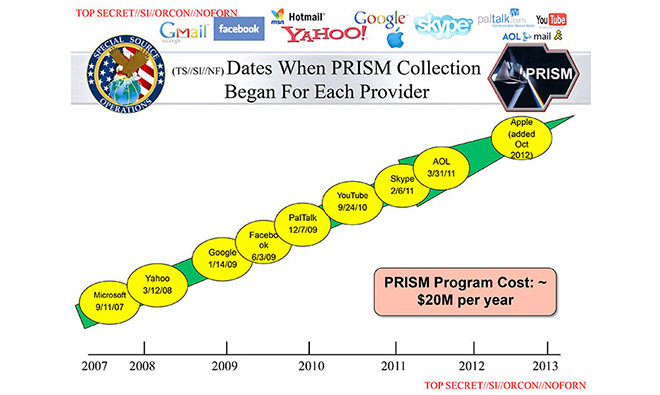A number of powerful tech companies sent an open letter to Congress, President Barack Obama and other government agencies on Wednesday, arguing for drastic change in the nation's surveillance laws that currently allow for bulk consumer data collection.
In the wake of U.S. cyber surveillance revelations aired by former NSA contractor Edward Snowden, global technology companies have joined forces with civil liberties organizations to put an end to bulk data collection.
An open letter (PDF link) calls for lawmakers to revisit the Patriot Act and curtail mass surveillance operations.
Representing a cadre of Silicon Valley companies, including Apple, Facebook, Google, Microsoft and Yahoo, among others, is the group Reform Government Surveillance. Other notable signatories include the ACLU, the Electronic Frontier Foundation and Human Rights Watch.
Together, the groups and private companies are looking to reform Sections 214 and 215 of the Patriot Act. Specifically, Section 215, which affords agencies like the NSA legal protection to perform mass data gathering exercises without warrant, is scheduled to expire on June 1. At that time, Lawmakers will be able to revisit the provision to make changes.
The letter names two main goals in the fight against mass surveillance. First and foremost is a "clear, strong, and effective end to bulk collection practices," but barring complete reform, the group says any deemed lawful data collection should incorporate safeguards to protect user privacy.
Secondly, a reworked doctrine should contain "transparency and accountability mechanisms" for both the government and private sector firms. The group is also requesting a "declassification regime for Foreign Intelligence Surveillance Court decisions."
Today's letter is in some ways a more strongly worded version of similar correspondence sent to Congressin late 2013.
For some companies, the push against mass surveillance is not so much rooted in an altruistic concern for the public good as it is the bottom line. Certain parties argue that consumers domestically and abroad could stop using their products for fear of government snooping, amounting to billions of dollars in losses.
 Mikey Campbell
Mikey Campbell








 Christine McKee
Christine McKee
 Malcolm Owen
Malcolm Owen
 Marko Zivkovic
Marko Zivkovic

 Andrew Orr
Andrew Orr
 Andrew O'Hara
Andrew O'Hara
 William Gallagher
William Gallagher





-m.jpg)



9 Comments
Good. Very good.
Not far enough. There's zero reason for Government Data collection. The NSA & DHS need to be completely abolished.
The dolts in Congress had better listen.
Otherwise, in the next few years, the brightest spot of innovation and value-creation in the US economy -- and by inference, the world -- will be toast.
Not far enough. There's zero reason for Government Data collection. The NSA & DHS need to be completely abolished.
I disagree with that. There are too many crazies in the world out to get us. (No, I am not paranoid.)
Certain parties argue that consumers domestically and abroad could stop using their products for fear of government snooping, amounting to billions of dollars in losses.
Certain parties argue that consumers domestically and abroad have stopped using their products because of government snooping, amounting to dollars lost.
That's better... and true.